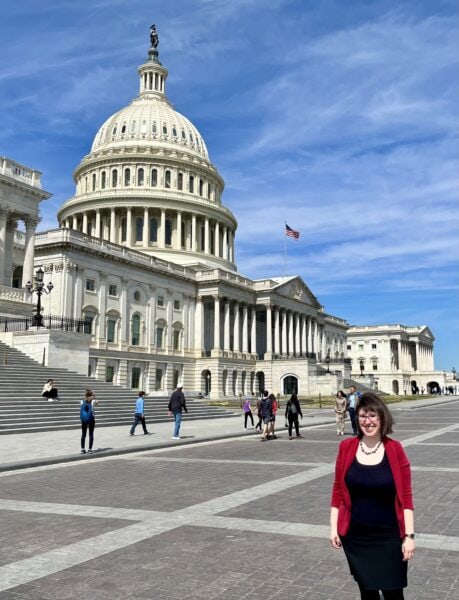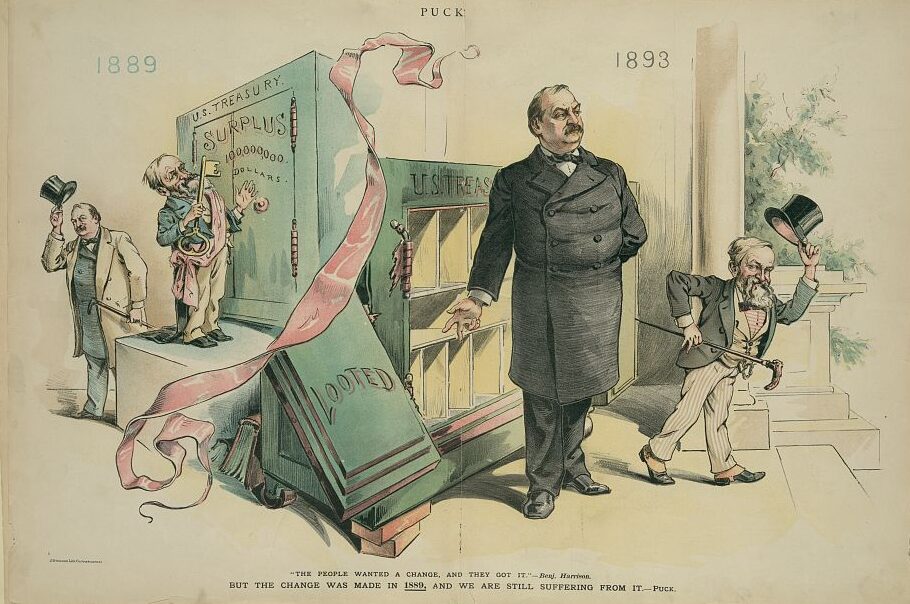The beginning of March saw the National Humanities Alliance (NHA) gearing up for the 2023 NHA Annual Meeting and Humanities Advocacy Day—the first to be held in person since 2020. Convened on March 20, the annual meeting included training sessions for advocacy work that would commence the following day, when state-based delegations visited members of Congress and their staff to promote increased FY 2024 funding for the National Endowment for the Humanities (NEH), the National Archives and Records Administration (NARA), and the Department of Education’s international education programs (Title VI and Fulbright-Hays).

Alexandra Levy, the AHA’s communications manager, visited the US Capitol to meet with legislative staff during the 2023 Humanities Advocacy Day. Alexandra Levy
This year, American Historical Association staff members Alexandra Levy and Sarah Weicksel participated, meeting with legislative staff from Virginia and Wyoming, respectively. “The congressional staffers I met with on Humanities Advocacy Day all expressed personal and professional interest in the humanities,” said Levy, the AHA’s communications manager. “It’s crucially important for constituents to email, call, and meet with their local and state representatives to urge support for the funding of the humanities.”
Looking back at related efforts from the previous year, the NHA finds much to celebrate. The humanities community’s robust advocacy yielded significant gains, including the largest-ever yearly increase for the NEH, bringing its budget to $207 million for FY 2023. The final appropriations omnibus bill, passed in mid-December, contained several other wins for our funding priorities:
- Title VI received $75.4 million, an increase of $3.5 million; Fulbright-Hays received $10.3 million, an increase of $500,000.
- The Institute of Museum and Library Services received $294.8 million, an increase of $26.8 million.
- NARA received $427.52 million, a $39.21 million increase, and its grant-giving arm, the National Historical Publications and Records Commission, received $9.5 million, a $2.5 million increase.
For a complete overview of the final funding level for all of our policy priorities, please see the NHA funding chart.
“It’s crucially important for constituents to email, call, and meet with their local and state representatives to urge support for the funding of the humanities.”
As the NHA turns our attention to FY 24 appropriations, it is crucial to cultivate strong bipartisan support, given the realities of a split Congress. With continuous effort, we are optimistic that we can build on past success in cultivating future bipartisan cooperation. Even when the Trump administration sought to defund the NEH year after year, a Republican-controlled Congress instead passed increases for the NEH. Over the past year, we have been hard at work to maintain and strengthen those resources, rallying advocates from across the country and cultivating bipartisan support of federal funding for the humanities.
NHA also has secured new bipartisan leadership for the Congressional Humanities Caucus. With the retirement of Representative David Price (D-NC-04), a new Democratic co-chair was needed to ensure that the caucus continued its work. In collaboration with the Federation of State Humanities Councils, we were able to bring on Representative Dina Titus (D-NV-01) as the new Democratic co-chair of the caucus in November. And in early February, we finally secured a Republican co-chair, Representative Mike Carey (R-OH-15), to fill a position that had been vacant since May 2021. We are so pleased to have bipartisan leadership once again, especially now that Republicans control the House. With members from both sides of the aisle leading the Congressional Humanities Caucus, we can show that federally funded humanities programs have bipartisan support.
Identifying Republican champions for both the National Archives and Title VI and Fulbright-Hays programs has been of paramount importance since March 2022, when Representative Don Young (R-AK-AL) died suddenly. Young had championed these causes, sending yearly letters on their behalf and asking other members of Congress to sign on. With his passing, we needed to find new Republican leadership on these issues and new sponsors for the letters.
Cultivating congressional support is not work that should be limited to Humanities Advocacy Day. In an effort to engage members of Congress beyond the confines of the Capitol chambers, we held a virtual briefing session in July 2022 to discuss the many ways the NEH supports Indigenous American languages, including the preservation of Native languages and lifeways through grants to study and document endangered languages and make related resources accessible to tribal members. Staffers heard directly from three NEH grantees about the profound impact that NEH funding has had on their work in language preservation and revitalization.
With members from both sides of the aisle leading the Congressional Humanities Caucus, we can show that federally funded humanities programs have bipartisan support.
In October, we partnered with Oklahoma Humanities to bring local humanities leaders, policymakers, and congressional staff together to discuss the impact of federal funding on Oklahoma communities. The event was attended by representatives from the University of Oklahoma, Oklahoma State University, the University of Tulsa, Northeastern State University, and Oklahoma Christian University, in addition to leaders of public humanities organizations such as the Philbrook Museum, the Oklahoma Museums Association, Thick Descriptions, and the First Americans Museum. In discussion, speakers highlighted the role that Oklahoma institutions play in connecting the public with groundbreaking humanities research and providing opportunities for discussion, connection, and education throughout the state; they also illustrated how federal dollars support high-impact humanities work. Following the conversation, the group took a private tour of the Oklahoma Museum of Art’s groundbreaking exhibition, Kiarostami: Beyond the Frame, which was supported by an Oklahoma Humanities grant.
The opportunities described above—and the funding that supports them—were the result of strong, year-round advocacy by the humanities community. None of these successes would be possible without the support of scholarly societies such as the AHA. Thanks to their ability to mobilize members, we were able to recruit advocates from all 50 states and Puerto Rico to participate in the 2022 Humanities Advocacy Day, which kicked off the work for our FY 23 wins.
All of these are positive steps forward, but our efforts to ensure bipartisan support for federally funding the humanities remain crucial. While anticipating that increases in domestic spending will be hard to come by, we are determined to impress upon members of Congress in both parties the importance of the humanities and the need to continue robustly funding these programs.
The National Humanities Alliance (NHA) is a coalition of more than 200 member organizations, including the American Historical Association. NHA advocates for the humanities on campuses, in local communities, and on Capitol Hill. James Grossman, the AHA’s executive director, is immediate past president of the NHA.
Alexandra Klein is communications and government relations manager at the National Humanities Alliance.
This work is licensed under a Creative Commons Attribution-NonCommercial-NoDerivatives 4.0 International License. Attribution must provide author name, article title, Perspectives on History, date of publication, and a link to this page. This license applies only to the article, not to text or images used here by permission.


